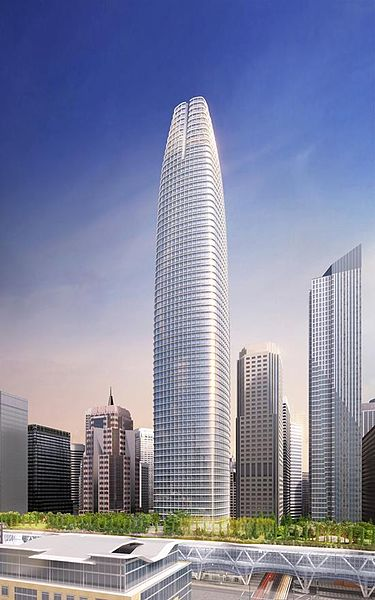
By Tim Redmond
SEPTEMBER 24, 2014 – After all the fuss and fury, and a scathing editorial in the Chronicle that some supervisors said was inaccurate, the vote on the Transbay Terminal deal today was moot: The key developer, as we had reported, backed away and is threatening to sue.
That opens another fascinating chapter in this story: The developers have been given exceptional benefits, including increased height limits, in exchange for their support for a special tax district that will pay for the new Transbay Terminal.
And if they sue, that entire offer – including all the zoning changes and building permits – can be cancelled, putting construction of the tallest building West of the Mississippi, the gleaming new Salesforce headquarters, in jeopardy.
And since the supervisors passed the original legislation – including the taxes that Boston Properties, the owner of the Salesforce site, doesn’t like – unanimously, there’s no indication that the city is backing down.
So now that big developer faces a choice: Accept the taxes that come with the building approvals – or risk going back to the starting blocks and losing everything.
Here’s the background:
The city needs about $1.4 billion to turn the Transbay Terminal into the regional transportation hub that the city needs. Caltrain and high-speed rail (which is going to happen eventually, and the sooner we do it the less it will cost) will end up there, along with all the buses.
So city planners cut a deal: In exchange for unusual, some would say radical, zoning changes that made building on the site far, far more profitable, the developers agreed to join what’s known as a Mello-Roos District.
The extra taxes they are supposed to pay would go to cover the cost of issuing revenue bonds (NOT backed by ordinary property-tax payers in the city) for the terminal project.
This is how massive development gets done, for better or for worse. It’s similar to the old Redevelopment Agency model, which had its very bad elements, but also some good sides: For years, redevelopment money funded affordable housing in San Francisco.
At any rate, Boston Properties accepted that arrangement back in 2008. But the value of the property has risen quite a bit since then – and since Mello-Roos taxes are based on the value of the property, so have the taxes. The developer says that’s unfair; anyone with any sense would agree that just creating this Transbay Terminal District was going to raise property values, which would rise anyway after the recession since SF property values, in the long term, only go in one direction.
Sup. Jane Kim met with all the relevant parties and had a deal, which it appeared everyone would take – the taxes stay the same, but they get paid off over 37 years, not 30. That led to a lot of argument about Net Present Value, a term economists use to determine what a future income stream is worth today. The Chron says the NPV would be lower. The city staff says it’s a wash. Wiener said at the board meeting that “contrary to the editorial in the paper today, the NPV is exactly the same.”
(John Diaz, editorial page editor at the Chron, told me he would need to check with Wiener before commenting. Haven’t heard back yet.)
All of the supervisors I’ve talked to have told me that they would never vote for a deal that undermined the city’s ability to get the full $1.4 billion bonding authority. That’s what matters – can we sell revenue bonds now and over the life of the project, backed by predictable taxes, to fund this giant civic project?
I asked Harvey Rose, the city’s budget analyst, who always, always has honest numbers, if he had reviewed the deal. Actually, he said, the only thing his office had done was to ensure that there was no fiscal impact on the city – that is, the Transbay Terminal Joint Powers Authority can issue the bonds without any liability for the General Fund.
So we can argue about NPV, and I’m not sure I’m smart enough to run those numbers myself, but it no longer matters: Boston Properties backed out of Kim’s deal. I don’t know if that’s what the developer’s $100,000 lobbyist, Willie Brown, advised, but it throws the whole future of the Transbay Terminal into question.
See, you can’t do a Mello-Roos district unless the property owners in the district vote for it. The deal with Boston Properties was that the company would support the Mello-Roos district; now, we don’t know.
Wiener asked Ken Rich, who is the mayor’s development director, what would happen if, through a lawsuit or a refusal to support the district, Boston Properties sought to undermine the plan. “If the developers oppose the Mello-Roos district, that would void all of their agreements with the city,” Rich said.
That would include, for example, revoking their building permits. No 1,000-foot-high Salesforce tower (which Salesforce has already leased; what happens then? Does Mark Benioff, who gave up a site near Pier 70 to get this downtown phallus, sue Boston Properties for completely screwing up his plans for the future of his company?)
Wiener: “The developers think they have a free ride here, that if we don’t reduce what they are paying in taxes they can blow it up. We need to let them know there are consequences for this.”
The mayor was really proud to have Salesforce sign a lease for this new tower. Everything was going along swimmingly. Boston Properties was going to make a lot of money, the city was going to get a nice new train-and-bus terminal … and then somebody decided to try to get a tax cut.
How’s that working out?






